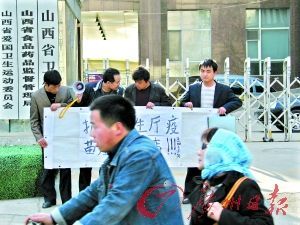Families want a shot of truth
A dozen families descended on a Xinhua News Agency bureau over the weekend, angered by an official's response to the vaccine scandal that has reportedly killed several children and sickened dozens of others.
?  |
|
The parents of victims have tried to push fot the health authorities to investigate the case invovling young lives. |
The families had traveled from all parts of north Shanxi province to the provincial capital of Taiyuan. They denied a provincial health official's claims that they had been interviewed by the health bureau, which said only one child had suffered a vaccine-related reaction.
"I don't know how they came up with that conclusion as they never checked with me about that," Wang Mingliang, whose 9-month-old son died in August 2008 after getting hepatitis B shots, told Guangzhou Daily on Saturday.
China Economic Times on Wednesday reported that four children died and another 76 got sick across the province after being vaccinated against hepatitis B, rabies and Type-B encephalitis from 2006 to 2008.
After the official's denial of the story, the angry families descended on the local Xinhua bureau on Saturday, telling staff there they had never been contacted by health officials, said a whistleblower and a former health official with the provincial center for disease control (CDC), Chen Tao'an.
"Xinhua, the State news agency, deleted the report immediately," he told China Daily on Sunday.
The report by China Economic Times indicated that the problem vaccines were stored without refrigeration by an unqualified private firm that had won a distribution and supply monopoly from the provincial CDC, probably by bribing key officials.
The company, Huawei Shidai Co, which later turned out to be unqualified to operate a vaccine-related business, withdrew from the sector in late 2007 under media pressure. The chief of the provincial CDC, Li Wenyuan, who was reportedly closely associated with Huawei's general manager Tian Jianguo, however, held the post until early retirement in July 2009.
More than 70 parents of victims have tried to sue health authorities in Shanxi province, which rejected their claims, citing an inquiry that found no connection between vaccines and the children's conditions, according to Chen.
"We'll not stop pushing for the authorities to investigate the case involving young lives and find out who's accountable," Chen noted.
For 32-year-old Gao Changhong from Jiaokou country of Shanxi, the case has just been one more unhappy blow in his life.
His elder son has been sick since receiving the type-B encephalitis vaccination, while his younger son is still suffering kidney problems after being fed with melamine-tainted Sanlu milk powder, Guangzhou Daily reported on Sunday.
"It has been almost three years and finally there's an over-due investigation. But the way local health authorities handled the case really failed us," Gao said.
"I feel desperate and sorry for my boys. Previously I thought the younger would help take care of his sick brother while he was growing up," Gao said.
The provincial health bureau said on Wednesday that an agency appointed by the Ministry of Health had tested samples of the stored vaccines, and they all complied with national standards with no adverse reactions reported.
But an official surnamed Zhao with the ministry's monitoring unit dismissed the bureau's claim, saying they only investigated the center's administrative issues, not vaccine safety.
The widely-circulated report into the vaccine issue by China Economic Times took almost seven months for renowned investigative reporter Wang Keqin to finish.
Wang said the report was based on sound facts through a long investigation and he would take full legal responsibility for its authenticity.
 0
0 






